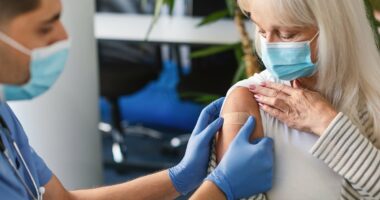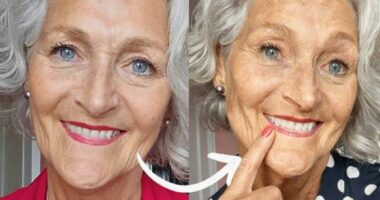Share this @internewscast.com
When Jennifer Celeste Briggs gave birth to her daughter Sarah in 2007, she was so small she only fit into clothing made for preemies – but she seemed to be in good health.
By six months, though, Briggs noticed something was ‘really different.’ Sarah wasn’t rolling over, lifting her head, or reaching for toys like other babies her age.
And so, specialists ran CT scans, MRIs, genetic testing, and ‘a lot of blood work,’ Briggs writes in her book Watching Sarah Rise: A Journey of Thriving with Autism.
In the end, results showed Sarah had a rare genetic anomaly that led to severe autism, and Briggs learned babies with Sarah’s condition often don’t learn to walk, talk, use the bathroom or feed themselves.
‘We had this diagnosis with a possibly bitterly difficult prognosis but no real information about our specific case,’ Briggs writes.
For the first four years of Sarah’s life, Briggs tried everything: occupational, speech, and physical therapy, along with water therapy, horseback riding therapy, feeding specialists, and even acupuncture.
However, while some of these therapies may help in cases of mild autism, Sarah’s case was so severe that nothing seemed to work.
Desperate to improve her daughter’s quality of life, Briggs attended three week-long sessions to receive training in an intensive therapy technique called The Son-Rise Program, which sees parents and child spend up to 40 hours a week in a special room engaging in a specific type of play.

Jennifer Celeste Briggs is pictured here with her daughter Sarah Briggs, who has a genetic abnormality that presents as autism

Sarah was born underweight and at six months old her mom noticed something was ‘different’
Sarah is just one of thousands of children in the US with autism spectrum disorder (ASD).
A CDC report released last month revealed rates of autism have increased to one in 31 children in the US, a staggering increase from one in 150 two decades ago.
It is unclear what is driving the rise in autism, but experts attribute it to better screening and diagnostics, while others blame environmental toxins, pesticides and ultra-processed foods.
Sarah’s first year was filled with challenges. She wasn’t gaining weight and eventually stopped eating. At nine months, doctors diagnosed her with Failure to Thrive.
Physical therapists, occupational therapists and a speech pathologist would visit the Briggs’ home in Pittsburgh, Pennsylvania, weekly to work with Sarah.
Her development was severely delayed and is wasn’t until she was 12 months old that Sarah finally sat up – something children typically do between six and eight months.
At 18 months, she began crawling. She didn’t walk until she was three.
By four, Sarah was making sounds and eating more regularly, but she still wasn’t speaking. That’s when Briggs turned to The Son-Rise Program.
Taught by the Autism Treatment Center of America (ATCA), the program empowers parents to create highly individualized therapy plans built around their child’s interests and cues.
Briggs explains that ATCA provides techniques to build connection, eye contact, language, and attention span through child-led play in a distraction-free space.
The approach can be adapted to any lifestyle, from a couple of hours a week to 40 or more.
The program was developed in the 1980s by Bears and Samahria Kaufman for their son, who was considered ‘supposedly unreachably autistic.’
After years of daily 12-hour sessions, he ’emerged from his autism completely’ and went on to graduate from an Ivy League college and become the ATCA’s global director.

‘It can be an intense undertaking but can have an enormous impact,’ Briggs writes.
She attended her first training session in 2011 and soon launched what she called The Sarah-Rise Program —’to honor the program as well as our daughter.’
Unlike conventional therapies, which require compliance from the child, The Son-Rise Program encourages the child to lead.
Instead of trying to stop repetitive behaviors, it embraces them as entry points for connection.
Briggs offers an analogy: ‘If I am watching my favorite TV show and you come over and tell me I should come watch your show instead, I will probably ignore you.
‘But if you sit and watch my show and love it too, then I will be more apt to trust your recommendation of what to watch next — your show.’
As soon as Briggs returned from her first week-long training session she began implementing what she learned.
She wrote: ‘I gave Sarah more space and time, but I also asked much more of her. I started interacting with Sarah differently.
‘I requested more in terms of language, and I waited for her response with more time, encouragement, and belief in her ability than I had previously given her.
‘I made her work a little harder.’

Sarah lives in Pennsylvania with her mom (center), younger sister (left) and dad (right)

Briggs underwent training for The Son-Rise Program, which she implemented daily for therapy with Sarah
And it worked. One day, Sarah asked for a milkshake: ‘Our world started shifting with the milkshake moment, and it didn’t stop there.’
When the family moved, they dedicated an entire room to The Sarah-Rise Program. It was intentionally bare to reduce distractions and encourage communication.
If Sarah played with Play-Doh, Briggs joined in — modeling words and showing her mouth movements so Sarah could mimic the sounds.
Early sessions lasted just 30 minutes. Briggs would mirror whatever Sarah did. If Sarah climbed stairs, Briggs followed — building a ‘moment of connection with her.’
As Sarah engaged more, Briggs added small layers. If Sarah played with candles and noticed her mom doing the same, Briggs put the candles in a toy cake.
If Sarah stayed engaged, Briggs would sing Happy Birthday.
This technique, called ‘Building,’ helps stretch interactions into shared experiences.
Within months, Sarah’s language development ‘exploded immediately.’
‘To hear her sounds and witness her earnest attempts at more language was all so exciting,’ Briggs wrote.
In one year, Sarah’s vocabulary grew from five partial words to 122 full words. She began speaking in sentences.
Briggs writes: ‘Sarah did not get things easily. We taught her everything in minute detail again and again and again. Sarah was certainly the final person putting things together, and she was remarkable in how she persevered to learn everything.’

Sarah is now 18 years old. She attends school and has a job

Sarah (right) is pictured above with her mother Jennifer and younger sister Amy
By nearly nine, Sarah was ready for kindergarten. She was the oldest in her class but made eye contact, used the toilet, ate well, played games, and could read and write.
The family continued the program with fewer hours in the therapy room and more time exploring new activities together.
Still, there were hard days. Briggs described moments of exhaustion, conflict, and the stress of balancing care for two children with the demands of daily life. But she remained committed — driven by Sarah’s progress and resilience.
Today, Sarah is 18. She attends school, has a job twice a week, takes piano lessons, rides a bike, and stars in school musicals. She’s also ‘best friends with her bus driver.’
‘She’s made incredible strides beyond where we ever dreamed possible… and she talks a ton,’ Briggs said in a YouTube video.
In her book, she reflects: ‘Sarah-Rise was an unmitigated success, helping not only Sarah but our whole family and all of those who took part in the program to become our best selves.
‘I have a peace and acceptance that is deeper and more solid than ever, and Sarah is flourishing beyond our wildest imaginings, especially compared to the days when we didn’t know if she would learn to roll over or eat or speak.
‘While Sarah-Rise may officially be over, it is forever the lens through which we connect and interact helpfully and meaningfully with Sarah.’
















